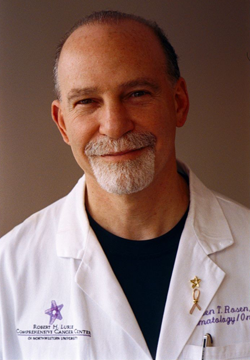Grant Support in 2007 Advances Lurie Cancer Center Goals

Fueled by substantial grant support in 2007, the Robert H. Lurie Comprehensive Cancer Center of Northwestern University sustains its status as a premier resource for patients seeking state-of-the-art care. Notable among recent grant awards was the receipt of a $25.6 million five-year renewal of a Cancer Center Support Grant from the National Cancer Institute. Among the largest awards ever received by the University, this grant maintains the Lurie Cancer Center’s status as the only NCI-designated comprehensive cancer center in Illinois—and one of only 39 such centers in the United States.
The Lurie Cancer Center, which sees approximately 15,000 new patients every year, offers the latest treatments and technologies for virtually every type of cancer, with special emphasis on breast, prostate and gastrointestinal cancers, hematologic malignancies, and pediatric oncology. “The reach and intensity of our work make us unique,” says Steven Rosen, MD, director of the Lurie Cancer Center and Genevieve E. Teuton Professor of Medicine. “We have a strong research component that fosters new developments in diagnosis and treatment of cancer, and our researchers work closely with our clinicians so that we can implement new discoveries quickly.” Dr. Rosen points to three other components that distinguish the Lurie Cancer Center. “We offer advanced care to many thousands of patients each year,” he says. “We also play an important role in education—training young doctors and researchers—and, we are a community outreach resource, providing information to the public about cancer and related preventive health issues.” The Lurie Cancer Center’s wide range of educational and community programs includes the international Lynn Sage Breast Cancer Symposium and the Cancer Survivors Walk, which draws approximately 3,500 participants each year.
Research funding, which exceeds $115 million annually, is a vital part of the center’s ability to stay in the forefront of cancer care. Clinical research focuses on cancer genetics, novel therapies, and stem cell transplants, as well as finding better treatment options across all disease areas. Basic science research focuses on all aspect of cell function.
Funding received in 2007 helped the Lurie Cancer Center advance several grant initiatives. In September, the Feinberg School was awarded a $21 million grant from the National Institutes of Health to research fertility threats posed to women by cancer treatment. Standard chemotherapy regimens can destroy a women’s ability to conceive children, and it is hoped that this new research, under the direction of Teresa K. Woodruff, PhD, Thomas J. Watkins Memorial Professor of Obstetrics and Gynecology, will create an interdisciplinary team of biomedical and social scientists, oncologists, pediatricians, social workers, and medical ethicists to help women preserve their fertility while being treated for cancer.
In late 2007, Northwestern University was awarded a five-year grant totaling $19 million from the National Cancer Institute to establish a Center for Cancer Nanotechnology Excellence. The center, one of just seven in the United States, will support multidisciplinary teams that will develop nanomaterials for cancer therapeutics, drug delivery, imaging, diagnostics, and monitoring applications. Principal investigator for this project is Chad A. Mirkin, PhD. Dr. Rosen says the nanotechnology center initiative offers great promise. “It helps us stay in the vanguard of research efforts that can further improve our ability to care for patients with cancer.”






